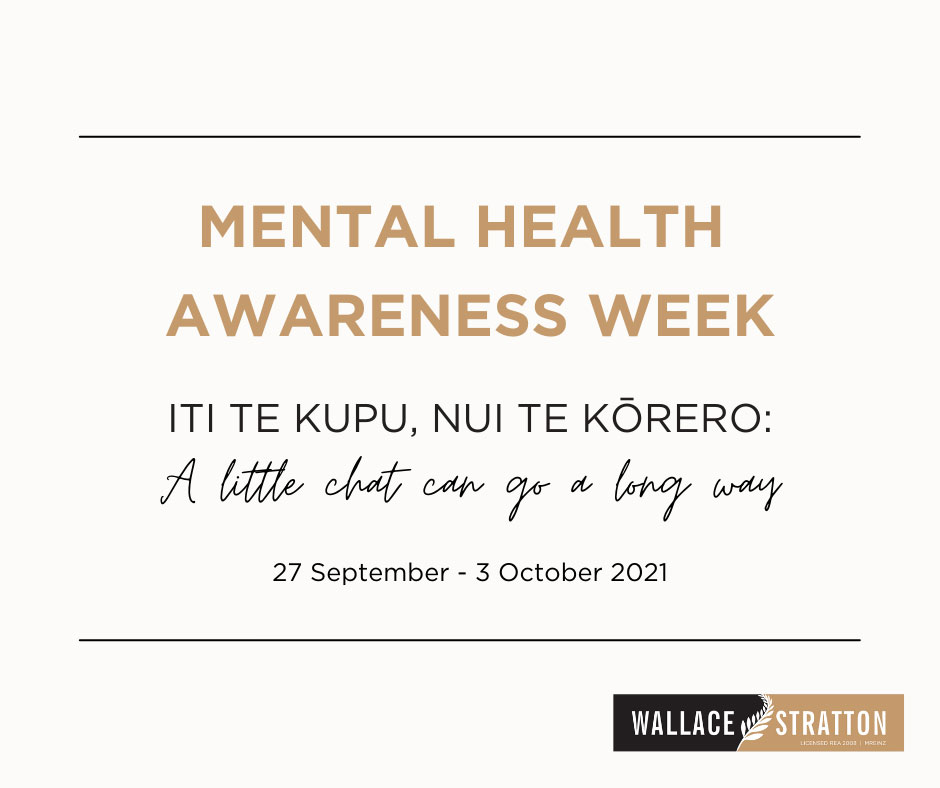
ITI TE KUPU, NUI TE KŌRERO – A little chat can go a long way
27 September – 3 October 2021
Wallace & Stratton support Mental Health Awareness Week(MHAW) run annually by the Mental Health Foundation and has been since 1993. MHAW is endorsed by the World Federation for Mental Health and is marked in over 150 countries at different times of the year.
This year’s theme is to take time to kōrero/mā te kōrero, ka ora – a little chat can go a long way. Taking time is all about connecting with the people in our lives and creating space for conversations about mental health and wellbeing. Whether it’s checking in with a mate, having a kōrero over some kai or saying hello to a stranger, a little chat can go a long way.
Five Ways To Wellbeing
The Five Ways to Wellbeing (Connect,Be Active, Take Notice, Keep Learning, Give) are simple and proven actions that workplaces can introduce to help their people find balance, build resilience and boost mental health and wellbeing.
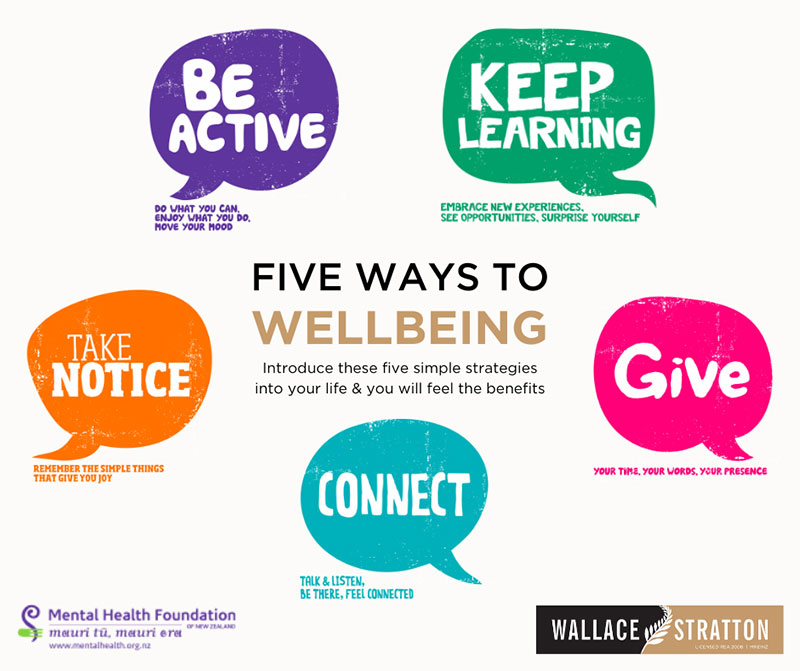
Why the Five Ways work:
- Connect: Strengthening relationships with others and feeling close to and valued by others, including at work, is critical to boosting wellbeing.
- Keep Learning: Being curious and seeking out new experiences at work and in life more generally positively stimulates the brain.
- Be Active: Being physically active, including at work, improves physical health and can improve mood and wellbeing and decrease stress, depression and anxiety.
- Give: Carrying out acts of kindness, whether small or large, can increase happiness, life satisfaction and general sense of wellbeing.
- Take Notice: Paying more attention to the present moment, to thoughts and feelings and to the world around, boosts our wellbeing.
The Five Ways in action:
- Connect with the people around you. With family, friends, colleagues and neighbours.
- Keep Learning. Try something new. Rediscover an old interest. Take on a new responsibility at work.
- Be Active. Go for a walk or run. Step outside. Garden. Play a game.
- Give. Do something nice for a team mate. Thank someone. Volunteer your time.
- Take Notice. Remark on the unusual. Notice the changing seasons. Savour the moment.
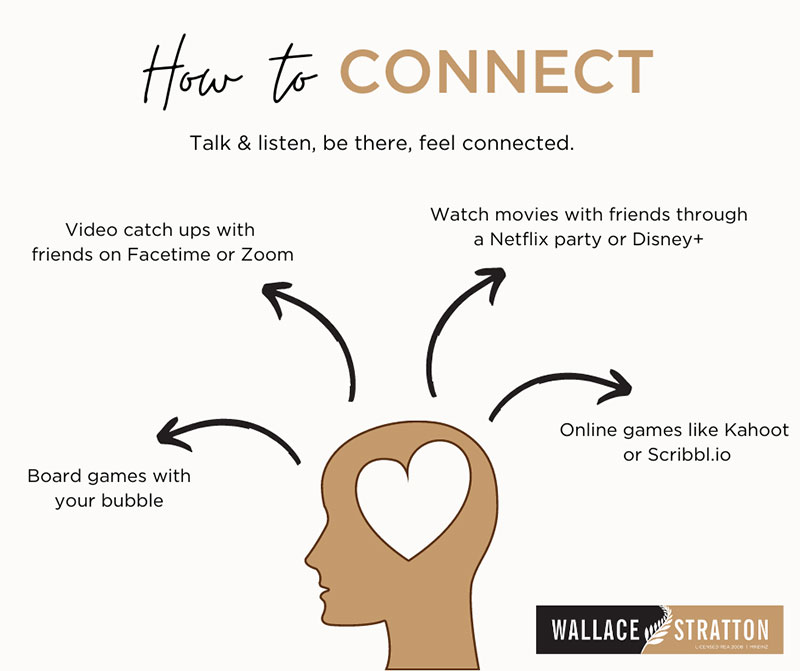
HOW TO CONNECT
Talk & listen, be there, feel connected
Connect with people who make you feel valued. This might include your whānau/family, friends, colleagues and neighbours. Here are some examples:
- Smile at someone else.
- Take the time to find out something you didn’t know about someone you know.
- Contact a friend you have not seen or spoken to for a while.
- Reach out to someone who may be lonely and invite them to spend time with you.
- Connect with someone you’ve lost touch with on social media and share a happy memory you have of them.
- Introduce yourself to a new parent or family at your child’s school.
- Eat dinner with the whānau. Play a game of ‘table talk’ where each person reports about their day’s events including the best thing that happened, the funniest thing and anything they didn’t enjoy.
- Take time to read your local newspaper or newsletter – find out what’s going on in your area.
- Host a potluck catch up or BBQ with neighbours, friends or whānau.
- Join a group: it could be your local sports team, book club, choir – whatever interests you most!
- Organise a baby photo competition with friends or colleagues – match the person to the baby!
- Connect with the whenua; grab some mates and get into the great outdoors – go on a bush walk, go surfing or mountain bike riding.
- Have a family WIFI, TV and text free day and bring out the old board games.
For more details on Mental Health Awareness Week visit mhaw.nz
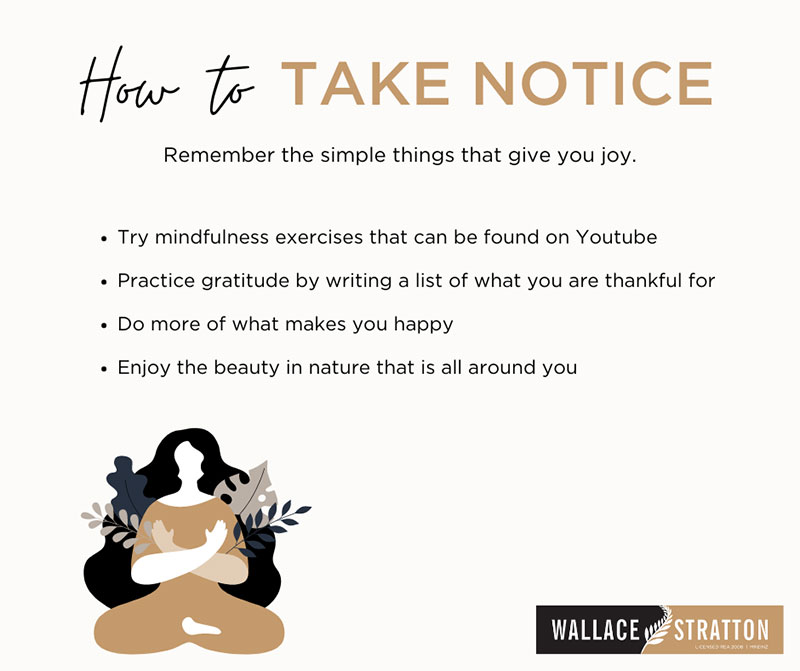
HOW TO TAKE NOTICE
Remember the simple things that give you joy
Paying more attention to the present moment, to our thoughts and feelings and to the world around us boosts our wellbeing. It helps us to behave in ways that make us feel good about ourselves – ways that are consistent with our values and who we want to be.
- Learn useful techniques for becoming more aware of life as it is happening. Stop for a while; take 10 mindful breaths in and out, calming the body and mind, then simply rest where you are noticing everything that is going on around you. This practice incorporates four keys aspects of mindfulness training: Stopping – Calming – Resting – Noticing. Together, these four steps are innately healing. Use an everyday environmental cue (the phone ringing, email alert etc) as a reminder to pause and breathe for three breath cycles, and take notice of the world around you.
- Learn yoga or meditation.
- Have a mirimiri/massage to soothe and relax your body.
- Be mindful of the first mouthful of food you eat. See if you can really pay attention to all the flavours and textures of the food, the act of chewing and the act of swallowing.
- Take the opportunity to sit quietly in a busy place like an airport or a mall and notice the interactions between people.
- Try to get out of your work environment during breaks. Go for a walk into a nearby park, being mindful of your breathing, your footsteps and the environment around you.
- Climb your maunga, swim in your awa or moana and kōrero karakia with tangaroa.
- Spend time gardening or create a green space in your home or office where you could grow a few small plants, such as herbs, on a windowsill.
- Take notice of the night sky. Learn the different phases of the moon so you can take notice of the phase it is in and watch the stars change throughout the year.
- Go for a bushwalk. Listen to the birds sing, and try to take notice of the different plant and animal species around you.
- Practise gratitude; keep a diary by writing down three things for which you are grateful on a daily or weekly basis. Take the time to give a special thank you to people who support you every day.
- At the end of the day ask friends, family or colleagues what the best thing was about their day and listen with interest when they respond.
- Begin meetings with a karakia/prayer or short reflection (eg, an inspiring quote) followed by a brief silent period, allowing people to breathe mindfully and bring their full attention into the room. End in a similar fashion.
For more details on Mental Health Awareness Week visit mhaw.nz
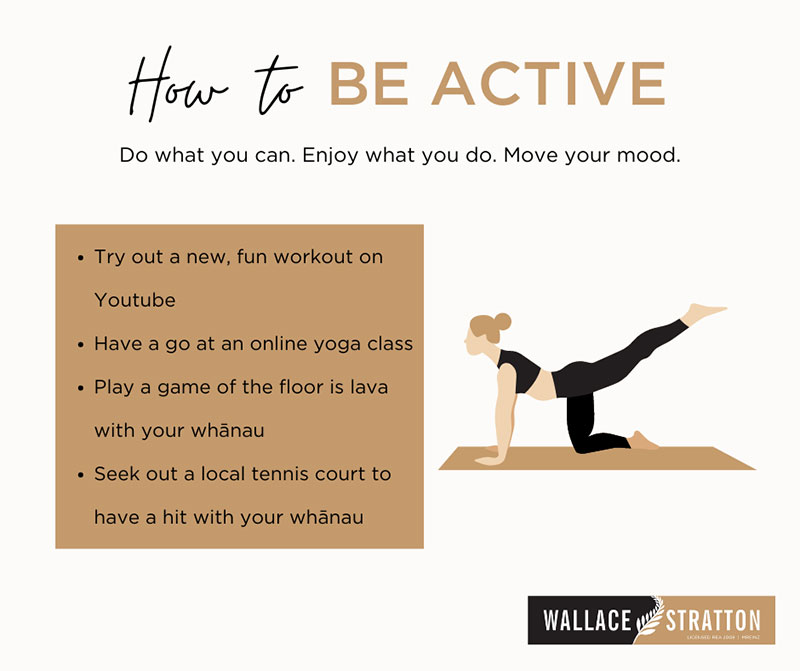
HOW TO BE ACTIVE
Do what you can. Enjoy what you do. Move your mood.
Being physically active is proven to boost our wellbeing and decrease stress, depression and anxiety.
When was the last time you went for a bike ride, a jog or a walk in the fresh air? Discover a physical activity you enjoy and one that suits your level of mobility and fitness. Do what you can, enjoy what you do, and move your mood.
- Bring activity into the everyday, eg. use the stairs instead of the lift, walk to colleagues to talk with them instead of phoning, and get off the bus one stop earlier than your stop.
- Try a ‘Have A Go day’ with a local sports group. Look out for what’s on offer, as often, free equipment and tuition is provided.
- Take a family walk after dinner or a longer one on the weekend. Let family members take turns to choose where to go.
- Hold a family dance-off with different members picking the music.
- Organise or participate in walking tours of local places of interest in your community or suburb.
- Participate in a fun run/walk to raise money for charity.
- Encourage senior students to put together a Top Town-style event for the junior school with wacky, fun activities that everyone can participate in.
- Start or join a walking bus for school children.
- Try tai chi classes for strength, balance and mental wellbeing.
- Go swimming or water walking at your local pool.
- Join a sports club to be active and meet people at the same time – tennis, bowls, touch rugby, netball, there is so much to choose from!
- Find out the most popular sport among your colleagues and then organise a match or tournament for staff.
- Check out your garden – pulling some weeds or planting something new can help you work up a sweat.
For more details on Mental Health Awareness Week visit mhaw.nz
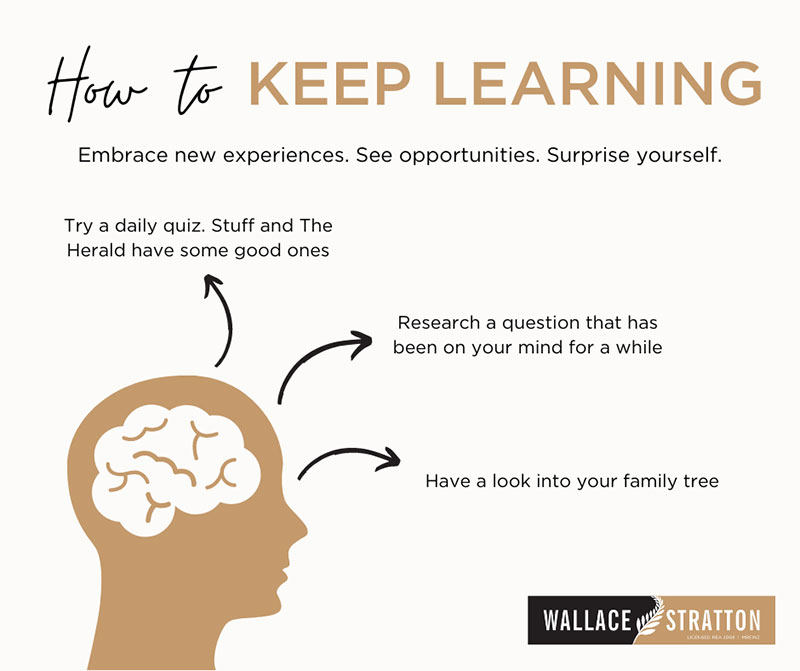
HOW TO KEEP LEARNING
Embrace new experiences. See opportunities. Surprise yourself
Learning, remaining curious and setting goals are important for everyone at every stage of life. It helps children’s brains to grow healthy and strong, helps them to learn social skills and community values. A love of learning as a child can prevent depression in later years.
Try something new or rediscover an old interest. Sign up for a course or take on a different responsibility at work. Learn to play an instrument or how to cook your favourite food. Set a challenge you will enjoy achieving – seek out new experiences and dare yourself!
- Learn something you don’t know about your hometown or local area – check out local history societies, books, plaques or talk to your neighbours.
- Write a bucket list – then try something you have always wanted to do but never actually done!
- Start learning a musical instrument.
- Learn a new skill – it could be anything from learning how to change a tyre to how to care for pot plants.
- Talk to children about what they’re learning about at school – kids love sharing what they’ve learnt and you’ll learn something new.
- Find and try out a new recipe.
- Try to identify one new plant a week – can you learn its name in English and Māori?
- Discover the name of the iwi, hapu, maunga and awa of the place you live.
- Memorise a new word every week. Practice using it among friends and family.
- Learn another language. E korero ki a koe Māori? Parlez-vous francais? Talar pu islensku?
- Put your hand up for a new challenge/training in your workplace to broaden your knowledge.
- Pass on any of the latest research you find that relates to your profession or sector.
- Make a list and try to read one new thing a month – you might like to borrow the books from your local public library.
- Learn about te maramataka – the Māori lunar calendar, and how Māori use it to guide their daily lives.
- Learn the local myths and legends from your area
- Start doing quizzes – online or with a group of friends. You’ll be surprised at how much general knowledge you pick up!
For more details on Mental Health Awareness Week visit mhaw.nz
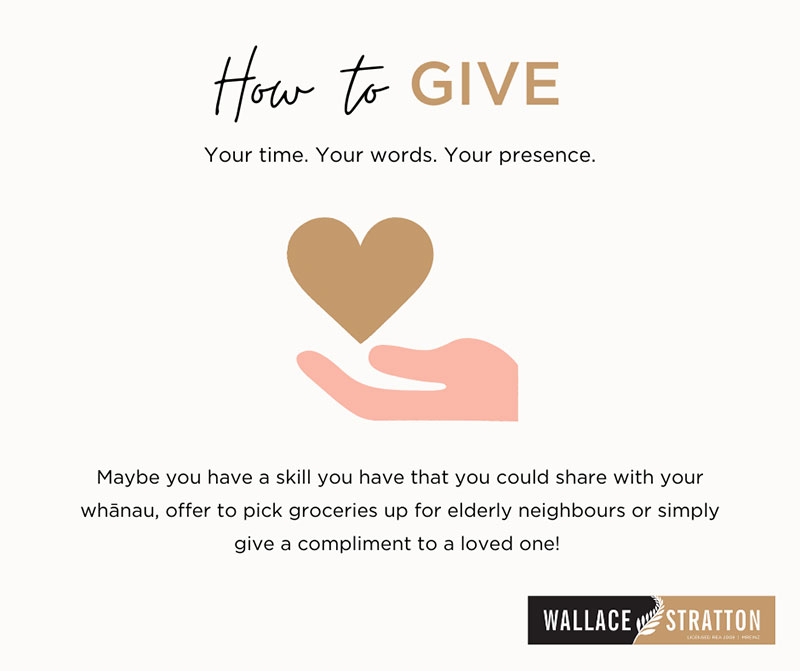
HOW TO GIVE
Your time. Your words. Your presence
Carrying out acts of kindness, whether small or large, can increase happiness, life satisfaction and a general sense of wellbeing. By helping others, sharing our skills and resources, we’re doing things that give us purpose and a sense that we’re a part of a team.
Do something nice for a friend, or a stranger. Thank someone, smile, or volunteer your time by joining a community group. It feels good to give! Everybody has something to offer. How will you play your part?
- Join or start and develop a neighbourhood Time Bank.
- Take opportunities to support and advocate for groups, friends, family or neighbours in need.
- Give a smile away!
- Organise or promote random acts of kindness days at school, work or when you’re out with a group.
- While driving, stop to let a car into the traffic.
- Offer to mow the grass verge of your neighbour’s property.
- Join a community clean up day – could be a local stream, river, beach or park – or a tree planting project with friends or family.
- If you have fruit trees pop your excess fruit out on the street with a “help yourself” sign.
- Donate old toys, books, sports equipment, clothes etc to a local charity.
- Help with school working bees and fundraisers.
- Offer to help an older neighbour with their wheelie bins on rubbish/recycling days.
- Give a compliment – acknowledge what someone in your life has done well.
For more details on Mental Health Awareness Week visit mhaw.nz

